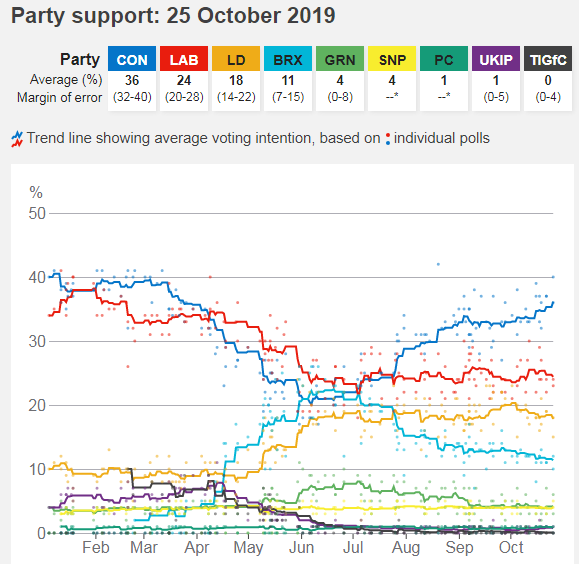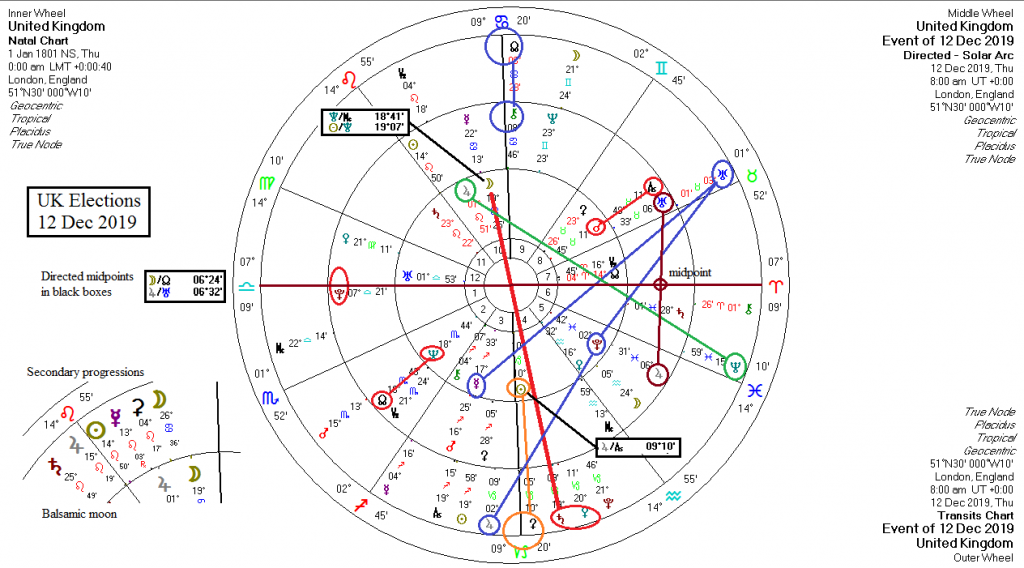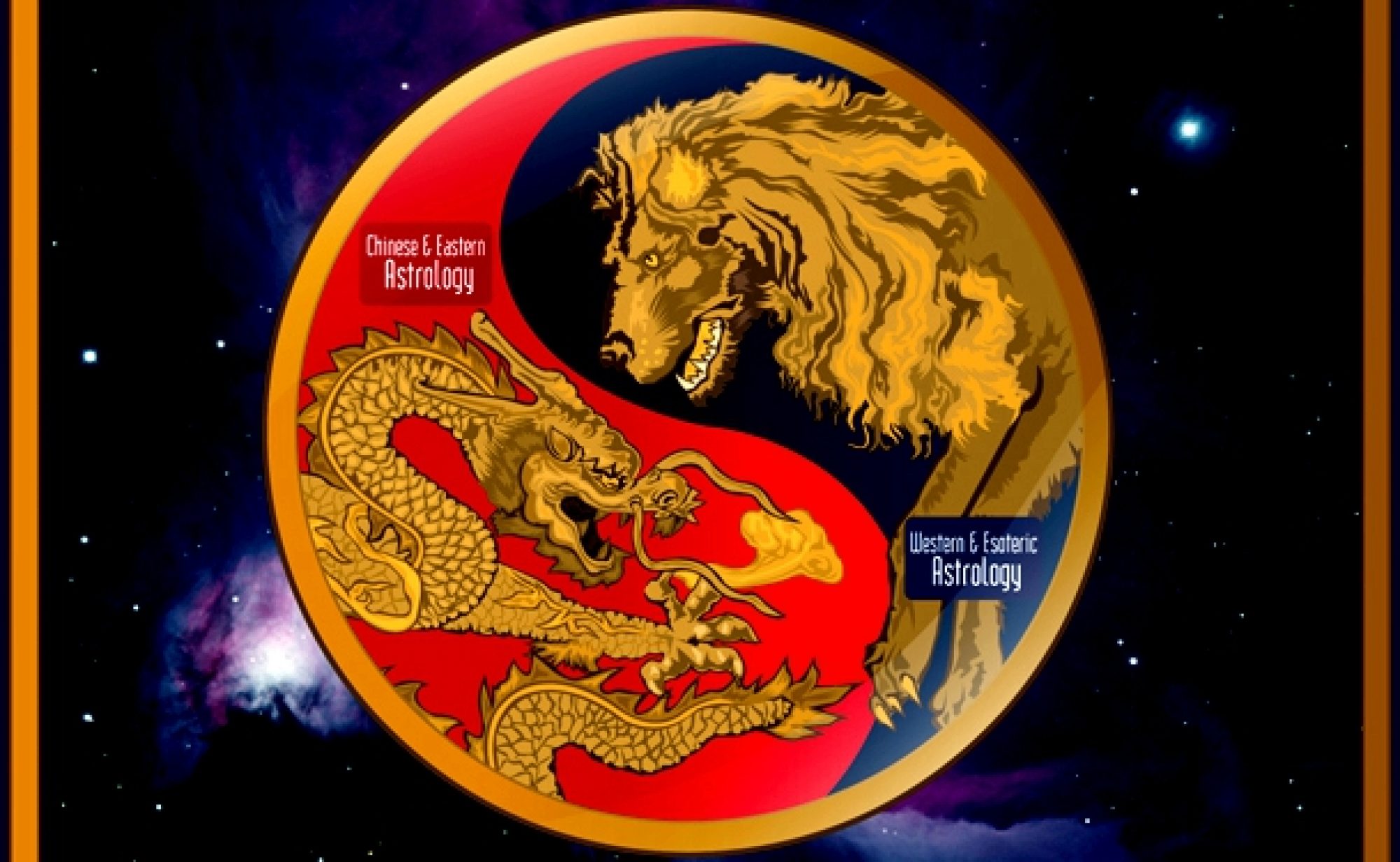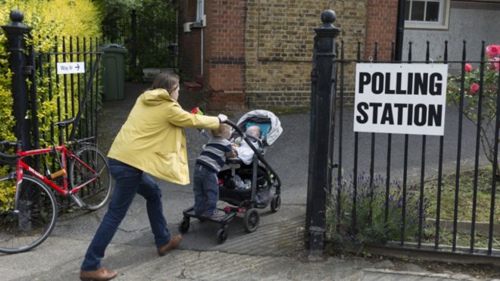The fourth election in the UK in five years – who would have thought? And all over Brexit. People in the UK are bewildered as to why their MPs would have voted for such a crazy idea. There are reflections of the UK in the US with its election cycle looming (started in earnest, actually) and similarities in the leadership of the two nations. Reactionary forces are seeking to further erode the social progress that was made in the years after WWII in both nations and put both nations on a path of extreme financial capitalism. But resistance is rising. This will be quite a telling election in the UK, and US voters as well should be paying attention. So, we will have a brief look at the projected outcomes. It is widely expected that Johnson and the Tories will romp it home and finally deliver Brexit. Hubris comes before the fall, though…
Below is a graph of the current polling since the start of the year. Now, as we well know, polls can be misleading. And as the article states, there are currently wide variations in the different polls, which they are at a loss to explain (?). Consider that all the polls in the US at the last election had Clinton taking the White House. But, bad campaign strategy handed the election to Donald Trump and largely at the last minute. The ‘left’ in the US – supposedly the Democrats – (there is not actually a ‘left’ in the US at the moment) played the election poorly, mainly out of overconfidence, and therein is a lesson for Labour and progressives in the UK.

What the graph shows is a clear win for the Tories were the election to be held now. But, there are several things to note. The Liberal Democrats polled low at the start of the year, with barely 10%. After April, their numbers rose sharply. Why? May’s Brexit deal got voted down. The Tories suffered one of their many defeats in the House. May had to step down. We note as well the Brexit Party rose sharply then, too, but then tapered off after Boris Johnson was chosen as PM, and their numbers have steadily declined since, largely because of leadership problems and the non-delivery of Brexit.
In June and until Boris was appointed, the polling numbers were pretty well even between the four major parties. The reason the two minor parties rose was because they offered an alternative to the Tories and Labour, the latter two being increasingly seen as feckless and unable to deliver for their voters. That changed for the Tories when Boris breathed new life into their Brexit hopes. So, we see that in a few weeks the numbers can change considerably, and that is based in public perceptions, which can be easily swayed. The Labour and Lib Dem’s numbers have not appreciably changed in the past couple of months. That brings us to the main themes in this election.
This election will be run on two main platforms – Brexit and the National Health Service (NHS). From a recent article:
“The main parties all have drastically different proposals on the matter; the Conservatives will tout Boris Johnson’s deal with the EU and claim they can get Brexit “done,” while Labour will negotiate a softer Brexit before giving the public the final say in a second referendum.
The Liberal Democrats, meanwhile, want to scrap Brexit altogether, and the Brexit Party are pursuing a no-deal split. But close watchers of British politics will recall that the 2017 poll was supposed to be all about Brexit too — in reality, voters care about other issues as well.
As per tradition, the Labour Party will likely make the revered National Health Service a central tenet of its campaign – and in particular the issue of whether a post-Brexit trade deal with the US will open up the health service to American commercialization. [There have been secret negotiations with the US and US drug companies regarding the NHS by the Tories in recent weeks.]
Labour leader Jeremy Corbyn, who has pushed the Labour Party further to the left, is also expected to unveil a dramatic swath of policy proposals; last time around, he touted the abolition of tuition fees, the nationalisation of Britain’s railways, water and energy companies, and an increased tax on Britain’s highest earners.
The Conservatives, meanwhile, also look set to highlight a commitment to the health service, touting increased investment in hospitals. They are also likely to pitch themselves as the party of law and order as concern over crime on British streets rises. The economy, so closely tied to the country’s Brexit fate, will be debated at length too, while issues such as social care, migration and education always rank highly amongst the priorities of British voters.”
And as to a Johnson ‘win’ being a certainty, there is this to consider, from the same article:
“Johnson clearly likes his chances enough to have called a vote. He’s enjoying a comfortable lead in the opinion polls of anything between 3 and 15 per cent, depending on which pollster you believe.
But May was sitting even prettier when she called the 2017 vote, before a surprisingly strong performance from Labour’s Jeremy Corbyn upended the predictions and forced a close result. Corbyn is historically a good campaigner, and if the numbers are tight again, his party has the benefit of having more potential coalition partners than the Conservatives.”
A total of 326 seats in the House is required to form government outright. Current polling shows a 58 seat lead by the Tories. But the polling numbers being all over the place reflect a fractured electorate, liable to change their minds at the last minute for any of a number of reasons. Therefore, nothing is certain in this vote. That is reflected in the chart, below (bigger):

There is one big indicator that Boris will not do well in the election, and that is the transiting Saturn opposite the UK Moon, at less than a degree of exactitude. The Moon rules the 10th house (the sitting government) as well as the public mood. Further, there are directed midpoints to the Moon – Nep/MC and Sun/Nep – both showing weakness and confusion, as well as obfuscation and lying. The general indicators are disappointed women and weak men, especially, and misinterpretation of the public mood by the government. If the opposition wants to do well, they need to focus on the secret meetings about the NHS with the US, the Tories’ attitude toward women and so forth.
Women will be a deciding factor in this election as well, with transiting Ceres on the IC conjunct the Sun, the latter ruling the 11th house (Parliament) and representing a change in attitude as well as a turning point for the opposition. Further, there is directed midpoint of Jup/Asc to the UK Sun, indicating ‘a fortunate or influential association’ – which we could read as coalition parties forming government. There are other factors indicated on the chart, but these are the main ones to take into account. What does this indicate, then? One of two things:
- A close election, resulting in a hung Parliament, or
- A Tory win, which could be the beginning of the end for the UK as it now stands.
Realistically, we can probably expect an upset against the government (the first point). People are much more aware of what is at stake now than they were at the initial Brexit vote. They also look at the US and then at what the Tories are planning with the US (for those in the know). There is also a third possibility:
- A last-minute surge in Labour and the Lib Dems, going on to form a coalition with a large enough majority to push through more progressive legislation and push the Brexit agenda further and further on the back burner for the next five years, if not cancelling it altogether. If Labor has to form government with the Lib Dems, then the cancellation of Art. 50 may be made a requirement
What we can also expect in the UK is the tabloid press and social media in the UK rolling out all the mud they can sling at the opposition parties and scaring enough of the British public to swing the vote to the Tories. The election will have to be decisively and skillfully played by the opposition parties if they want a win, with a big focus on social media and rallying of the young vote. The young and women will have to be heavily lobbied and targeted. And little as they may like it, the opposition will need to have enough mud to push back against the tabloid onslaught. This will not be an election that will be won on high-minded principles. Remember 2016 in the US and UK and what happened then.
As to the 2nd bullet point above, it is not so far-fetched, nor is it scaremongering. Having watched the debates leading up to the election vote in the House, both the Irish and the Scots have clearly stated they will be voting for independence if the Tories win and try to force through more austerity and extreme financial capitalism. Both countries voted to stay in the EU at the Brexit vote by wide margins.
Further, in another recent article it was stated:
“Parliament had blocked Brexit by voting for it. There was a clear choice between economic disaster under Labour or economic catastrophe under the Tories.”
It was a bit of satire, but the ideas on both sides will be presented as such by various media in the UK in the next weeks. Elections are usually won and lost around economics, and everyday UK citizens have not been happy with their economic lot in recent years, especially under the Tory governments.
When we come down to the real reason for Brexit, it is a symptom, not a cause, of a people fed up with the direction their government has chosen. We’ll say again, leaving the EU will not change the lot of the British, except probably in a worse way. George Galloway has exposed the real reason why enabling Brexit has been so problematic, and it lies with the fact that Ireland is not really two separate countries, Northern and Republic. It was set up that way to retain some sort of control by the English over the island.
“The six counties of the north east of Ireland were unnaturally torn from the Irish motherland a century ago, but its status was always historically speaking, doomed. Despite its gerrymandered borders, tortuously carved to ensure a built-in Protestant (pro-British unionist) majority, and its near-apartheid treatment of its Catholic minority including disenfranchisement of many, the writing was already on the wall.”
In one sense the divided Ireland has stopped Brexit thus far, but it is a false narrative. Karma coming home to roost, perhaps, because of the poor decisions a century ago of an empire about to fall. For all the talk about escaping the EU ‘superstate’, what we see with the Brexit debate, which has brought about this election, are two factions of elites doing battle, one in the City of London and the other Europe-wide – and then across the ocean yet another. These elites are the powerful, moneyed interests each seeking their own interests, uncaring of the public.
From what I hear, the British citizen on the street wants all of those elites to rack off, start listening and stop mucking them around. They want their social programs back, their workers’ rights restored and a decent, living wage. It is not too much to ask. The great majority of problems for the British would die away if those were restored. And that can be done either within or outside the EU. It is up to the British people to decide, and that is where this election should by rights be focused – the true will of the people.
So, we watch this space. But be well advised to put on your wellies. The mud will be deep and flowing freely. Nothing will be certain until the votes are counted after the 12th of December, and expect the unexpected.
Featured pic from BBC News

